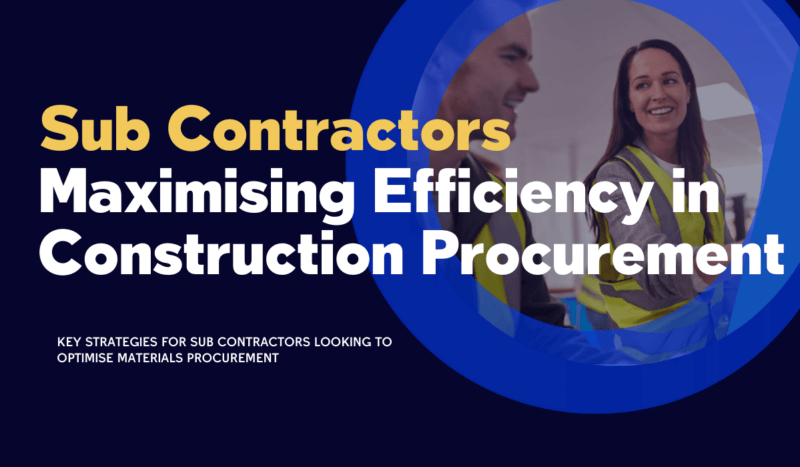Procurement in construction is a critical process that directly impacts project timelines, costs, and overall success. Efficient procurement ensures that the right materials are available at the right time and price, allowing projects to proceed smoothly and without unnecessary delays or budget overruns.
Achieving procurement efficiency can be challenging given the complexities of supply chains, fluctuating material prices, and the need for meticulous coordination among various stakeholders, so we’ve put together some tips to help construction companies streamline their procurement processes.
Key Strategies for Optimising Procurement
- Embrace Digital Transformation
Traditional methods like endless emails, spreadsheets, and phone calls are no longer sufficient. Digital platforms provide visibility, automation, and real-time updates, allowing you to manage suppliers, track materials, and ensure projects run smoothly. - Foster Collaboration and Transparency
Procurement is not a one-person job. Establishing clear communication channels with suppliers, subcontractors, and other stakeholders ensures everyone is aligned. Tools that centralize information make it easier to share updates, address issues, and build stronger relationships. - Leverage AI for Better Decision-Making
Advanced platforms like The Build Chain now integrate AI to provide smart recommendations on suppliers, pricing trends, and materials availability. By relying on AI-driven insights, businesses can avoid costly mistakes and secure better deals. - Prioritise Sustainability
ESG considerations are becoming a critical factor in procurement. Choosing sustainable materials, working with eco-conscious suppliers, and reducing waste not only benefits the planet but also improves compliance and reputation within the industry. - Focus on Risk Management
Late deliveries, quality issues, and supplier insolvencies are common risks in construction procurement. Using platforms with integrated financial risk assessments and supplier scoring helps mitigate these challenges and ensure reliability.
Plan Procurement Early and Thoroughly
The foundation of efficient procurement lies in early and detailed planning. Establish a clear understanding of your project’s material needs well in advance. This includes forecasting material quantities, understanding lead times, and identifying potential suppliers. Early planning allows for better negotiation with suppliers and helps avoid last-minute rush orders that can inflate costs.
Leverage Technology for Streamlined Processes
Digital tools and platforms are revolutionising construction procurement. By leveraging technology, you can automate many aspects of procurement, such as sending out requests for quotes (RFQs), comparing supplier bids, and managing orders. This not only saves time but also reduces the likelihood of human errors that can cause delays or increase costs.
Build and Maintain Strong Supplier Relationships
Strong relationships with suppliers are essential for efficient procurement. Reliable suppliers are more likely to offer competitive pricing, timely deliveries, and flexible repayment terms. Maintain regular communication with your suppliers and consider developing strategic partnerships where possible. This can lead to preferential treatment, such as early access to new products or more favourable terms during times of material shortages.
Implement a Supplier Comparison System
It’s essential to have a robust system for comparing suppliers on various parameters, such as price, delivery timelines, and reliability. This allows you to make informed decisions that balance cost with quality and availability. Implementing a comparison tool that consolidates supplier information in one place can significantly reduce the time spent evaluating options and improve the accuracy of your decisions.
Focus on Sustainability and Compliance
As legislation and client requirements change, sustainability is only increasing in importance. Ensure your procurement process includes checks for sustainability and compliance with environmental regulations. This might involve sourcing materials from local suppliers to reduce carbon emissions or choosing products with lower environmental impact. Not only does this contribute to your corporate social responsibility goals, but it can also enhance your company’s reputation and help win more contracts.The time is now for construction sub contractors to take ESG seriously It’s important to ot get left behind with your competitors and can be a strong message when looking to win projects.
Use Data to Drive Procurement Decisions
Data is a powerful tool in procurement. Collect and analyse data from past projects to identify trends, forecast future needs, and make data-driven decisions. For example, tracking material costs over time can help you anticipate price increases and budget accordingly. Additionally, maintaining a database of supplier performance can guide you in choosing the most reliable partners for future projects.
Regularly Review and Optimise Your Procurement Process
Procurement is not a set-it-and-forget-it process. Regularly review your procurement strategies and processes to identify areas for improvement. This could involve adopting new technologies, re-negotiating supplier contracts, or refining your approach to supplier comparison. Continuous optimisation ensures that your procurement process evolves with industry changes and keeps your projects running efficiently.
Consider Centralising Your Procurement
For larger construction companies, centralising procurement can lead to significant efficiencies. A centralised procurement team can co-ordinate orders across multiple projects, negotiate bulk discounts, and ensure consistency in the materials used across different sites. This approach can also simplify compliance and reporting, as all procurement activities are managed through a single department.
Prioritise Clear Communication Across Teams
Efficient procurement relies on clear communication between the procurement team, project managers, and suppliers. Establishing standardised communication protocols and using collaborative platforms can help keep everyone on the same page, reducing the risk of misunderstandings that could lead to delays or errors.
Enhance Your Procurement Efficiency with The Build Chain
Implementing these tips and best practices can significantly boost the efficiency of your construction procurement process. However, managing these tasks manually or across disconnected systems can still be a challenge. This is where The Build Chain can make a difference.
The Build Chain is an innovative procurement platform designed specifically for the construction industry. It streamlines every aspect of procurement – from planning and supplier comparison to order management and compliance tracking.
With The Build Chain, you can send out enquiries to multiple suppliers with just a few clicks, easily compare quotes, and manage all your orders in one centralised system. Plus, the platform’s sustainability features help you track and reduce your carbon footprint, making it easier to meet your environmental goals.
Ready to take your procurement process to the next level? Try The Build Chain today and experience the future of construction procurement. Book a demo with our team and let us help you build faster and more efficiently.




